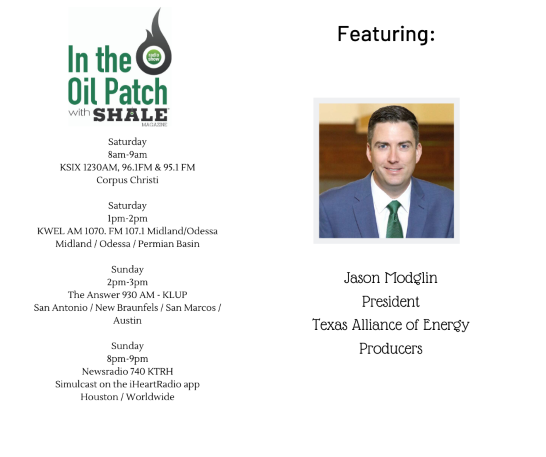
Texas is required to pass a new two-year budget soon, and oil and gas advocates need their voices heard in the Capital. How does that work during a pandemic? Jason Modglin weighs in on that dilemma on the latest episode of In the Patch Radio Show.
Kym Bolado: David, I want you to jump in here because I know you have tons of questions, and I have thrown my questions at Jason quite a bit. So I’m going to give you an opportunity. Go ahead.
David Blackmon: Hey, Jason. I’ve worked for years and years with folks from the Alliance in Austin. That was my background when I was in the industry. And you’ve always been so effective on public policy work there with the legislature. And of course, we’re now in the second half of the year before session. Traditionally, in days gone by, the legislature has begun around this time of year starting to hold preliminary committee hearings to try to figure out what the agenda is going to be for the next session. But given COVID-19 and all the restrictions on face to face meetings, I’m wondering if you guys have had any guidance from people’s legislature about how all that’s going to work. Will there be face to face hearings? Are they going to try to do them using technology from remote locations? Do you have any sense of how that’s all going to work this time?
Jason Modglin: Both chambers, the Texas House of Representatives as well as the Senate, had put on pause any meetings until August. What we have seen through pictures, not actually in person, is that they have outfitted some committee rooms and even the floor of the Texas house with plexiglass in order to potentially conduct operations. It’s an incredible sight to see. What I hope is that both chambers will avail themselves of some new technology like Zoom or virtual meetings. But it’s a challenge. Both chambers’ rules limit their ability to do virtual meetings, so it’s going to be a building process there. But we hope they can get to work and hit the ground running when they start in January.
Kym Bolado: There’s a lot of session time. There’s a lot of buses of people, be it educators or advocates for oil and gas that load up and go to the Capitol and talk to their elected officials. How’s that going to work?
Jason Modglin: It’s going to be a challenge. I’m already thinking about how to get a branded Texas Alliance of Energy Producers mask so that they can see me coming. That’s going to be required, unfortunately, but it’s all part of keeping folks safe and trying to prevent further spread. But it’s going to be a challenge. We’ve had the capitol effectively closed to visitors and tourists since late March. That’s difficult when conducting business as well as passing a two year budget that’s required by our Texas constitution.
Kym Bolado: You recently testified, I think it was last week, at the RC meeting. Can you tell us what you were testifying for? And, I know this is kind of right up your alley, but are there new things that the Texas Railroad Commission is dealing with along with the operators?
Jason Modglin: Absolutely. Chairman Christian had asked operators and the Blue Ribbon Task Force to come back and offer him some flaring recommendations to reduce routine flaring in the state.
Kym Bolado: Yeah, he’s a big advocate of that. He wants to see flaring go down.
Jason Modglin: Absolutely, absolutely. He wants to reduce that. So the industry came together, and it was called the Texas Methane and Flaring coalition, and there is still an ongoing effort there, and their website will continue to be updated. All recommendations were to continue to update the railroad commission’s website to provide more data and more resources for operators to increase reporting. We also recommended some best practices be utilized by industry to increase planning. This is not a big oil versus little oil problem. Thoughtful planning can really help reduce flaring. But there were also some recommendations to reduce the administrative approvals of flaring permits and the exceptions. So, we’re going to be working with the commission to find ways to target and reduce routine flaring, along with a number of other associations in the state.
David Blackmon: Jason, when you say reduce approvals, do you mean reduce the number of approvals, or to somehow streamline the process?
Jason Modglin: The recommendation was where there is no pipe access to actually reduce the number of days permitted to flare in half. So there would be a time crunch, if you will, on operators that they would need to move a little quicker to get gathering systems hooked up and that gas handled, without going to flare.














